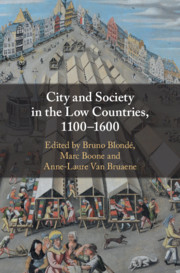Book contents
- Reviews
- City and Society in the Low Countries, 1100–1600
- City and Society in the Low Countries, 1100–1600
- Copyright page
- Dedication
- Contents
- Figures
- Contributors
- Acknowledgements
- 1 City and Society in the Low Countries: Urbanisation and Urban Historiography
- 2 Economic Vitality: Urbanisation, Regional Complementarity and European Interaction
- 3 Living Together in the City: Social Relationships Between Norm and Practice
- 4 ‘The Common Good’: Governance, Discipline and Political Culture
- 5 Civic Religion: Community, Identity and Religious Transformation
- 6 Urban Space: Infrastructure, Technology and Power
- 7 At Home in the City: The Dynamics of Material Culture
- 8 Education and Knowledge: Theory and Practice in an Urban Context
- 9 Epilogue: The Legacy of the Medieval City in the Low Countries
- Select Bibliography
- Index
1 - City and Society in the Low Countries: Urbanisation and Urban Historiography
Published online by Cambridge University Press: 24 September 2018
- Reviews
- City and Society in the Low Countries, 1100–1600
- City and Society in the Low Countries, 1100–1600
- Copyright page
- Dedication
- Contents
- Figures
- Contributors
- Acknowledgements
- 1 City and Society in the Low Countries: Urbanisation and Urban Historiography
- 2 Economic Vitality: Urbanisation, Regional Complementarity and European Interaction
- 3 Living Together in the City: Social Relationships Between Norm and Practice
- 4 ‘The Common Good’: Governance, Discipline and Political Culture
- 5 Civic Religion: Community, Identity and Religious Transformation
- 6 Urban Space: Infrastructure, Technology and Power
- 7 At Home in the City: The Dynamics of Material Culture
- 8 Education and Knowledge: Theory and Practice in an Urban Context
- 9 Epilogue: The Legacy of the Medieval City in the Low Countries
- Select Bibliography
- Index
Summary
- Type
- Chapter
- Information
- City and Society in the Low Countries, 1100–1600 , pp. 1 - 21Publisher: Cambridge University PressPrint publication year: 2018



